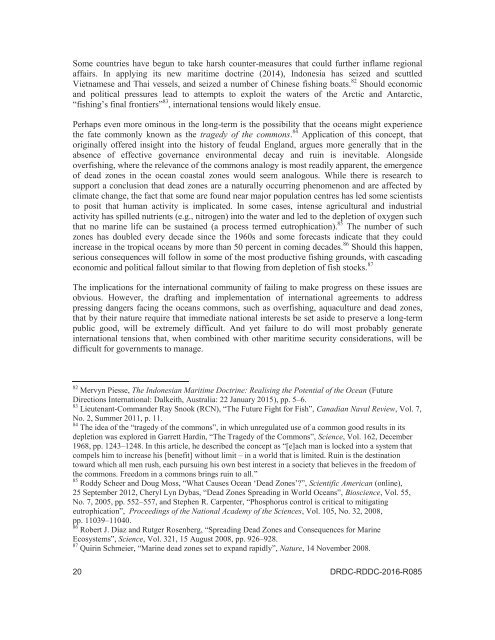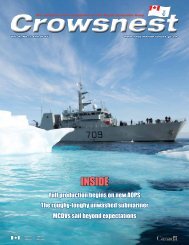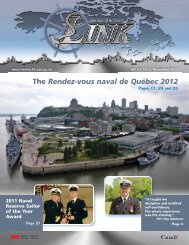Create successful ePaper yourself
Turn your PDF publications into a flip-book with our unique Google optimized e-Paper software.
Some countries have begun to take harsh counter-measures that could fur<strong>the</strong>r inflame regional<br />
affairs. In applying its new maritime doctrine (2014), Indonesia has seized <strong>and</strong> scuttled<br />
Vietnamese <strong>and</strong> Thai vessels, <strong>and</strong> seized a number <strong>of</strong> Chinese fishing boats. 82 Should economic<br />
<strong>and</strong> political pressures lead to attempts to exploit <strong>the</strong> waters <strong>of</strong> <strong>the</strong> Arctic <strong>and</strong> Antarctic,<br />
“fishing’s final frontiers” 83 , international tensions would likely ensue.<br />
Perhaps even more ominous in <strong>the</strong> long-term is <strong>the</strong> possibility that <strong>the</strong> oceans might experience<br />
<strong>the</strong> fate commonly known as <strong>the</strong> tragedy <strong>of</strong> <strong>the</strong> commons. 84 Application <strong>of</strong> this concept, that<br />
originally <strong>of</strong>fered insight into <strong>the</strong> history <strong>of</strong> feudal Engl<strong>and</strong>, argues more generally that in <strong>the</strong><br />
absence <strong>of</strong> effective governance environmental decay <strong>and</strong> ruin is inevitable. Alongside<br />
overfishing, where <strong>the</strong> relevance <strong>of</strong> <strong>the</strong> commons analogy is most readily apparent, <strong>the</strong> emergence<br />
<strong>of</strong> dead zones in <strong>the</strong> ocean coastal zones would seem analogous. While <strong>the</strong>re is research to<br />
support a conclusion that dead zones are a naturally occurring phenomenon <strong>and</strong> are affected by<br />
climate change, <strong>the</strong> fact that some are found near major population centres has led some scientists<br />
to posit that human activity is implicated. In some cases, intense agricultural <strong>and</strong> industrial<br />
activity has spilled nutrients (e.g., nitrogen) into <strong>the</strong> water <strong>and</strong> led to <strong>the</strong> depletion <strong>of</strong> oxygen such<br />
that no marine life can be sustained (a process termed eutrophication). 85 <strong>The</strong> number <strong>of</strong> such<br />
zones has doubled every decade since <strong>the</strong> 1960s <strong>and</strong> some forecasts indicate that <strong>the</strong>y could<br />
increase in <strong>the</strong> tropical oceans by more than 50 percent in coming decades. 86 Should this happen,<br />
serious consequences will follow in some <strong>of</strong> <strong>the</strong> most productive fishing grounds, with cascading<br />
economic <strong>and</strong> political fallout similar to that flowing from depletion <strong>of</strong> fish stocks. 87<br />
<strong>The</strong> implications for <strong>the</strong> international community <strong>of</strong> failing to make progress on <strong>the</strong>se issues are<br />
obvious. However, <strong>the</strong> drafting <strong>and</strong> implementation <strong>of</strong> international agreements to address<br />
pressing dangers facing <strong>the</strong> oceans commons, such as overfishing, aquaculture <strong>and</strong> dead zones,<br />
that by <strong>the</strong>ir nature require that immediate national interests be set aside to preserve a long-term<br />
public good, will be extremely difficult. And yet failure to do will most probably generate<br />
international tensions that, when combined with o<strong>the</strong>r maritime security considerations, will be<br />
difficult for governments to manage.<br />
82 Mervyn Piesse, <strong>The</strong> Indonesian <strong>Maritime</strong> Doctrine: Realising <strong>the</strong> Potential <strong>of</strong> <strong>the</strong> Ocean (<strong>Future</strong><br />
Directions International: Dalkeith, Australia: 22 January 2015), pp. 5–6.<br />
83 Lieutenant-Comm<strong>and</strong>er Ray Snook (RCN), “<strong>The</strong> <strong>Future</strong> Fight for Fish”, Canadian <strong>Naval</strong> Review, Vol. 7,<br />
No. 2, Summer 2011, p. 11.<br />
84 <strong>The</strong> idea <strong>of</strong> <strong>the</strong> “tragedy <strong>of</strong> <strong>the</strong> commons”, in which unregulated use <strong>of</strong> a common good results in its<br />
depletion was explored in Garrett Hardin, “<strong>The</strong> Tragedy <strong>of</strong> <strong>the</strong> Commons”, Science, Vol. 162, December<br />
1968, pp. 1243–1248. In this article, he described <strong>the</strong> concept as “[e]ach man is locked into a system that<br />
compels him to increase his [benefit] without limit – in a world that is limited. Ruin is <strong>the</strong> destination<br />
toward which all men rush, each pursuing his own best interest in a society that believes in <strong>the</strong> freedom <strong>of</strong><br />
<strong>the</strong> commons. Freedom in a commons brings ruin to all.”<br />
85 Roddy Scheer <strong>and</strong> Doug Moss, “What Causes Ocean ‘Dead Zones’?”, Scientific American (online),<br />
25 September 2012, Cheryl Lyn Dybas, “Dead Zones Spreading in World Oceans”, Bioscience, Vol. 55,<br />
No. 7, 2005, pp. 552–557, <strong>and</strong> Stephen R. Carpenter, “Phosphorus control is critical to mitigating<br />
eutrophication”, Proceedings <strong>of</strong> <strong>the</strong> National Academy <strong>of</strong> <strong>the</strong> Sciences, Vol. 105, No. 32, 2008,<br />
pp. 11039–11040.<br />
86 Robert J. Diaz <strong>and</strong> Rutger Rosenberg, “Spreading Dead Zones <strong>and</strong> Consequences for Marine<br />
Ecosystems”, Science, Vol. 321, 15 August 2008, pp. 926–928.<br />
87 Quirin Schmeier, “Marine dead zones set to exp<strong>and</strong> rapidly”, Nature, 14 November 2008.<br />
20 DRDC-RDDC-2016-R085




